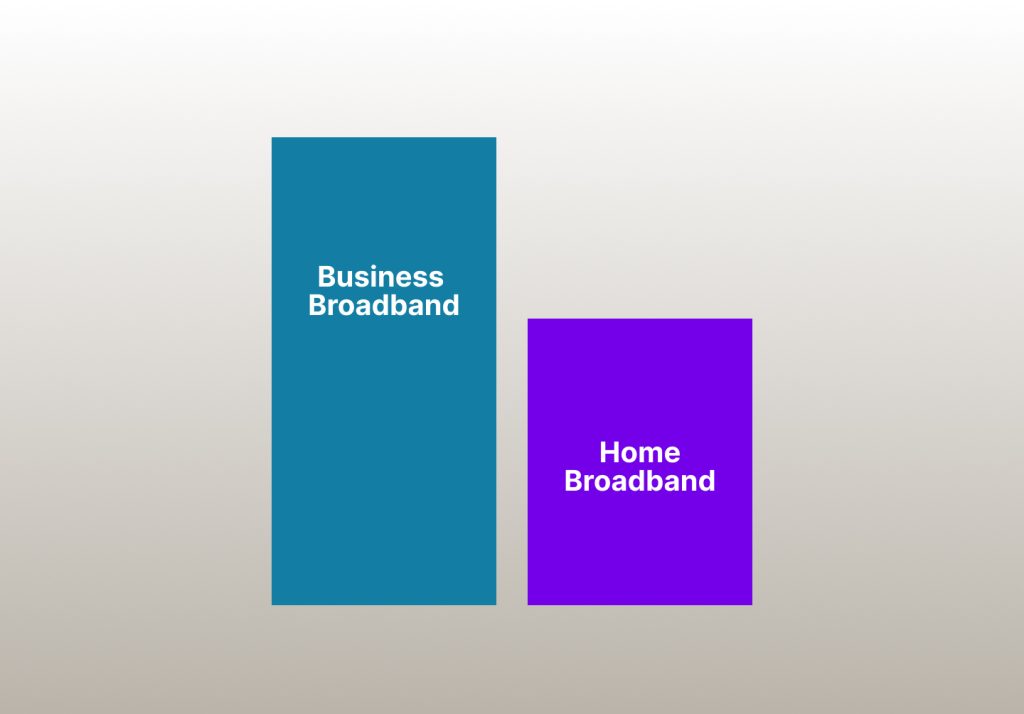
Running a business is all about making the right choices, and let’s be honest, not all decisions are straightforward. One of the most crucial yet often overlooked decisions is your choice of internet connection. Whether you’re managing a startup from your living room or operating a growing company with multiple employees, the quality of your broadband can directly impact your productivity, communication, and bottom line. With the increased demands of remote work, online collaboration, cloud-based services, and constant customer engagement, relying on a basic home broadband connection may no longer cut it. So, how do you know if it’s time to switch to a business broadband plan? And more importantly, what exactly does business broadband offer that your home service doesn’t? Let’s dive deep into the world of business broadband, uncovering everything you need to know to make an informed decision.
What is business broadband?
At its core, business broadband is a high-speed internet service specifically designed to meet the demands of businesses, whether small startups, growing enterprises, or large corporations. Unlike residential broadband, which caters to casual browsing, streaming, and general household use, business broadband is tailored for environments where multiple users need to be online simultaneously, and reliability is non-negotiable.
If you’re running a business, you need more than just an internet connection—you need a connection that can support the complexities of modern business operations. This includes everything from video conferencing with clients to hosting a company website, managing cloud-based software, and providing secure access for remote employees.
Business broadband packages often include features that are vital for smooth business operations, such as:
- Higher speeds and more bandwidth to accommodate multiple users and devices.
- Enhanced security features to protect sensitive data.
- Service Level Agreements (SLAs) that guarantee uptime and quick response times.
- Dedicated customer support that understands the unique needs of businesses.
Whether you’re working from a small office, a home-based setup, or a larger corporate environment, business broadband offers the speed, reliability, and support necessary to keep your operations running smoothly.
What comes with a business broadband package?
When you sign up for business broadband, you’re not just getting a high-speed connection; you’re investing in a service that provides much more than meets the eye. Here’s a breakdown of what typically comes with a business broadband package:
1. Enhanced Security Features
In today’s digital age, security is a top priority for any business. Cyber threats are more sophisticated than ever, and a data breach can have devastating consequences, from financial loss to reputational damage. Business broadband packages often include advanced security features designed to protect your company’s sensitive data and online activities.
These security features might include firewalls, anti-virus software, and automatic updates that ensure your systems are protected against the latest threats. With business broadband, you can also benefit from secure connections, encrypted communications, and dedicated IP addresses, which add additional layers of protection.
For businesses that handle sensitive customer information, financial data, or intellectual property, the enhanced security that comes with business broadband is not just a bonus—it’s a necessity.
2. Business-Grade Router
The router you receive with a business broadband package is a significant step up from the standard routers that come with home broadband plans. These business-grade routers are built to handle the demands of a busy office environment, where multiple users and devices are accessing the internet simultaneously.
A business-grade router typically offers:
- Better Performance: These routers are designed to provide fast and stable connections, even when many devices are connected at once.
- Extended Range: If you have a large office space, a business-grade router can ensure that every corner of your office has a strong Wi-Fi signal.
- Traffic Prioritization: This feature allows you to prioritize bandwidth for critical tasks like video conferencing, VoIP calls, or cloud applications, ensuring that your most important activities always have the resources they need.
This isn’t just about getting online—it’s about getting online with the confidence that your connection will be strong, reliable, and able to support your business’s needs.
3. Static IP Address
One of the key features of business broadband is the provision of a static IP address. Unlike a dynamic IP address, which changes periodically, a static IP address remains constant. This is particularly useful for businesses that need a stable and consistent address for certain functions.
A static IP address is essential for:
- Hosting servers: If your business hosts its own website, email, or FTP server, a static IP address is crucial for ensuring that external systems can reliably connect to your servers.
- Remote access: Businesses that offer remote work or need to access internal systems from outside the office benefit from the consistency and reliability of a static IP address.
- Enhanced security: Static IP addresses can be more secure when properly configured, as they allow for better monitoring and management of traffic.
For businesses that rely on consistent communication and access between networks, a static IP address is a significant advantage that standard home broadband simply doesn’t offer.
4. Prioritization of Traffic
In an office environment, not all internet traffic is created equal. Some tasks—like downloading large files or watching YouTube videos—can be bandwidth-intensive but aren’t always crucial to your business operations. Meanwhile, other tasks—like VoIP calls, video conferences, or accessing cloud-based applications—are mission-critical and require a smooth, uninterrupted connection.
Business broadband services often include traffic prioritization, which ensures that the most important applications and services receive the bandwidth they need. This can significantly improve the quality of voice calls, reduce lag during video conferences, and ensure that your team can work efficiently without slowdowns or interruptions.
Imagine you’re in the middle of a crucial video conference with a client, and suddenly your connection starts to lag because someone else in the office is downloading a large file. With traffic prioritization, this scenario becomes much less likely, as your business-critical tasks are always given priority.
5. Service Level Agreements (SLAs)
When you’re running a business, downtime is not an option. Every minute your internet is down can mean lost revenue, missed opportunities, and frustrated clients. That’s why business broadband typically comes with a Service Level Agreement (SLA), which guarantees a certain level of service.
An SLA will outline the key performance metrics you can expect from your internet service, including:
Uptime Guarantees: This specifies the percentage of time the service will be available, often guaranteed at 99.9% or higher.
Speed Commitments: This ensures that you receive the speed you’re paying for, even during peak usage times.
Response Times for Support: If something goes wrong, the SLA will detail how quickly the provider will respond and resolve the issue.
In the event of a service disruption, SLAs often include compensation clauses, meaning you could receive financial compensation if the provider fails to meet the agreed-upon standards. For businesses that rely heavily on their internet connection, this level of assurance is invaluable.
6. Dedicated Customer Support
One of the most significant benefits of business broadband is the level of customer support you receive. Unlike residential broadband, where customer support can sometimes be slow or generic, business broadband typically comes with dedicated support tailored to the needs of businesses.
This means:
Faster Response Times: If you experience an issue, you can expect quicker resolution times than with home broadband.
Expert Technicians: The support staff are trained to deal with complex business-related issues, from troubleshooting network problems to advising on optimal configurations for your business.
Proactive Monitoring: Some business broadband providers offer proactive monitoring, identifying and resolving issues before you even notice them.
This level of support ensures that if anything goes wrong, you can get back up and running quickly, minimizing any impact on your business operations.
How does business Broadband differ from home broadband?

At first glance, business broadband and home broadband might seem similar—they both provide internet access, after all. However, when you dig deeper, the differences become clear. These differences aren’t just about speed or cost; they’re about the level of service and the features that come with each option.
1. Speed and Bandwidth
While both home and business broadband can offer high speeds, business broadband typically provides higher speeds and more bandwidth. This is crucial for businesses where multiple employees need to be online simultaneously, accessing cloud-based software, video conferencing, or transferring large files.
In a business setting, slow internet isn’t just an inconvenience—it can be a significant barrier to productivity. With business broadband, you’re less likely to experience slowdowns during peak usage times, ensuring that your team can work efficiently and without interruption.
2. Reliability and Uptime
One of the most critical differences between home and business broadband is reliability. Home broadband is designed for general use, and while it can be reliable, it doesn’t come with the same guarantees as business broadband. If your home broadband goes down, it’s frustrating, but it’s unlikely to have serious consequences.
For a business, however, downtime can be catastrophic. Business broadband services prioritize reliability, often offering SLAs that guarantee uptime. This means you can trust that your connection will be available when you need it, and if something goes wrong, it will be fixed quickly.
Additionally, many business broadband providers offer automatic failover solutions. This means that if your primary connection goes down, your service will automatically switch to a backup connection, minimizing any disruption to your operations.
3. Advanced Features
As mentioned earlier, business broadband comes with a range of advanced features that you won’t typically find with home broadband. These include static IP addresses, enhanced security, and traffic prioritization. These features are essential for businesses that need a stable, secure connection for tasks like hosting servers, running VPNs, or managing remote access systems.
For businesses that rely on a reliable connection for critical operations, these features are not just nice-to-haves—they’re essential. Without them, your business could be vulnerable to security risks, connection instability, and other issues that could disrupt your operations.
4. Flexibility and Scalability
Business broadband plans are designed to grow with your company. As your business expands, you may need more bandwidth, additional static IP addresses, or enhanced security features. Business broadband providers understand this and offer plans that can be easily scaled up to meet your evolving needs.
Home broadband, on the other hand, is typically less flexible. While you can upgrade your speed or bandwidth, these plans are not designed to accommodate the unique requirements of a growing business. This lack of flexibility can be a significant drawback if your business outgrows your current plan.
Why is business broadband more expensive than home broadband?

The cost of business broadband can be higher than home broadband, and it’s natural to wonder why. The simple answer is that you’re not just paying for an internet connection—you’re investing in a service that offers superior reliability, enhanced features, and dedicated support.
1. Higher Speeds and Bandwidth
Business broadband packages often provide significantly higher speeds and more bandwidth than home broadband plans. This allows for faster uploads and downloads, smoother video conferencing, and more reliable cloud access, all of which are crucial for business operations.
2. Advanced Security
With cyber threats becoming more prevalent, the advanced security features that come with business broadband are a crucial selling point. These features, including firewalls, anti-virus protection, and encrypted communications, help to protect your business from potential attacks, ensuring that your data remains safe.
3. Service Level Agreements
The inclusion of SLAs in business broadband plans adds to the cost, but it also provides peace of mind. Knowing that your provider guarantees a certain level of service, with compensation for any failures, means that you can focus on running your business without worrying about unexpected disruptions.
4. Dedicated Customer Support
The cost of business broadband also reflects the level of customer support you receive. With faster response times and expert technicians who understand the unique needs of businesses, you’re paying for a service that ensures any issues are resolved quickly and efficiently.
For most businesses, the higher cost of business broadband is justified by the benefits it provides. The enhanced reliability, security, and support mean that you can operate with confidence, knowing that your internet connection will meet your needs, no matter what.
Is business broadband better than home broadband?

In most cases, the answer is yes—especially if your business relies on a fast, stable, and secure internet connection. Business broadband offers a level of service that home broadband simply can’t match, with superior speed, reliability, and support.
If your business involves hosting websites, using cloud-based services, or communicating with clients via VoIP or video conferencing, the enhanced features of business broadband can make a significant difference in your day-to-day operations. You’ll experience fewer disruptions, faster speeds, and a connection that can handle whatever your business throws at it.
Can business broadband be used at home?

While business broadband is designed for professional environments, it can also be used at home—particularly if you’re running a home-based business or working remotely. The enhanced speed, security, and reliability can make working from home much more efficient, allowing you to maintain productivity even when you’re not in the office.
However, it’s essential to consider the cost. Business broadband typically comes with a higher price tag than home broadband, so you’ll need to weigh the benefits against the expense. If you’re managing a home office or running a small business from your house, the investment may be worthwhile, but for general home use, it might be overkill.
Can you use home broadband for business?

While it’s possible to use home broadband for business purposes, it’s not always ideal. Home broadband plans are designed for casual use—streaming, browsing, social media—not for the demands of a busy work environment. If you’re running a business that relies on a stable and secure internet connection, home broadband may fall short.
1. Limited Speed and Bandwidth
Home broadband plans often offer lower speeds and less bandwidth than business plans. If you have multiple employees or devices accessing the internet simultaneously, you may experience slowdowns, lag, or even disconnections. This can be particularly problematic if you’re hosting video conferences, managing cloud-based applications, or need to transfer large files.
2. Lack of Advanced Features
As mentioned earlier, home broadband doesn’t typically include features like static IP addresses, advanced security, or traffic prioritization. Without these features, your business may be vulnerable to security risks, connection instability, and other issues that could disrupt your operations.
3. No Service Level Agreements
Home broadband plans don’t come with SLAs, which means you have no guarantee of uptime, speed, or support response times. If your internet goes down, you may be left waiting for hours or even days for a resolution—time that could be costly for your business.
Conclusion
Choosing the right broadband plan is about more than just speed; it’s about finding a service that meets the specific needs of your business. From enhanced security and reliable uptime to dedicated support and advanced features, business broadband offers a level of service that home broadband simply can’t match.
If you’re a small business owner, a remote worker, or managing a growing enterprise, investing in business broadband is an investment in the future of your company. It provides the stability, security, and support you need to stay connected, productive, and competitive in today’s fast-paced business environment.
In the end, the decision between home and business broadband comes down to your specific needs and priorities. If you value reliability, security, and support, and if your business relies on a fast and stable internet connection, business broadband is the clear choice. Take the time to evaluate your options, consult with providers, and choose a plan that will serve your business well both now and in the future.